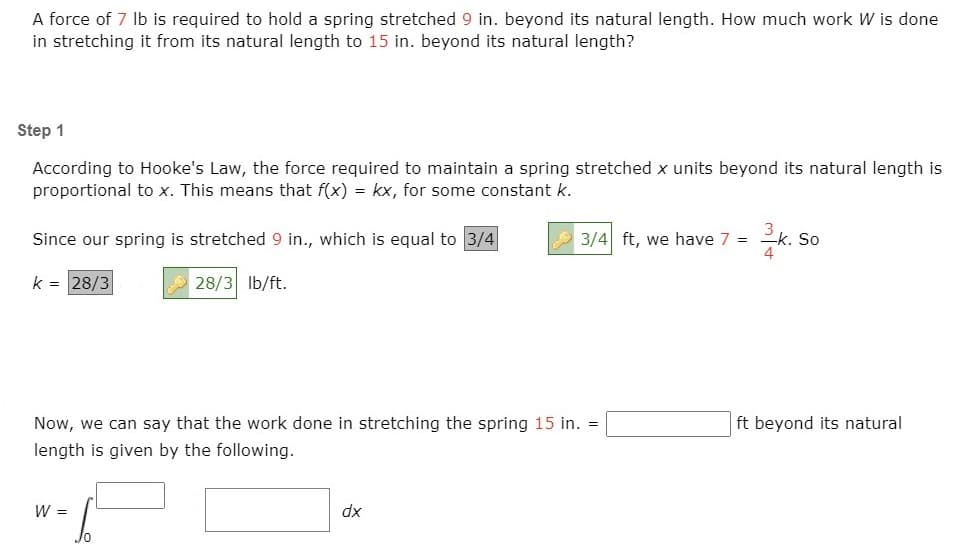A force of 7 lb is required to hold a spring stretched 9 in. beyond its natural length. How much work W is done in stretching it from its natural length to 15 in. beyond its natural length? Step 1 According to Hooke's Law, the force required to maintain a spring stretched x units beyond its natural length is proportional to x. This means that f(x) = kx, for some constant k. Since our spring is stretched 9 in., which is equal to 3/4 3/4 ft, we have 7 = So k = 28/3 28/3 Ib/ft. Now, we can say that the work done in stretching the spring 15 in. = ft beyond its natural length is given by the following. W = dx
A force of 7 lb is required to hold a spring stretched 9 in. beyond its natural length. How much work W is done in stretching it from its natural length to 15 in. beyond its natural length? Step 1 According to Hooke's Law, the force required to maintain a spring stretched x units beyond its natural length is proportional to x. This means that f(x) = kx, for some constant k. Since our spring is stretched 9 in., which is equal to 3/4 3/4 ft, we have 7 = So k = 28/3 28/3 Ib/ft. Now, we can say that the work done in stretching the spring 15 in. = ft beyond its natural length is given by the following. W = dx
Functions and Change: A Modeling Approach to College Algebra (MindTap Course List)
6th Edition
ISBN:9781337111348
Author:Bruce Crauder, Benny Evans, Alan Noell
Publisher:Bruce Crauder, Benny Evans, Alan Noell
ChapterA: Appendix
SectionA.2: Geometric Constructions
Problem 10P: A soda can has a volume of 25 cubic inches. Let x denote its radius and h its height, both in...
Related questions
Question
Stuck need help!
Problem is attached.
please view before answering.
Please explain answer so I can fully understand.
*i need to fill in the blanks
Thank you so much!

Transcribed Image Text:A force of 7 Ib is required to hold a spring stretched 9 in. beyond its natural length. How much work W is done
in stretching it from its natural length to 15 in. beyond its natural length?
Step 1
According to Hooke's Law, the force required to maintain a spring stretched x units beyond its natural length is
proportional to x. This means that f(x) = kx, for some constant k.
Since our spring is stretched 9 in., which is equal to 3/4
3/4 ft, we have 7 =
So
k = 28/3
A 28/3 Ib/ft.
Now, we can say that the work done in stretching the spring 15 in. =
ft beyond its natural
length is given by the following.
W =
dx
Expert Solution
This question has been solved!
Explore an expertly crafted, step-by-step solution for a thorough understanding of key concepts.
This is a popular solution!
Trending now
This is a popular solution!
Step by step
Solved in 3 steps

Recommended textbooks for you

Functions and Change: A Modeling Approach to Coll…
Algebra
ISBN:
9781337111348
Author:
Bruce Crauder, Benny Evans, Alan Noell
Publisher:
Cengage Learning


Functions and Change: A Modeling Approach to Coll…
Algebra
ISBN:
9781337111348
Author:
Bruce Crauder, Benny Evans, Alan Noell
Publisher:
Cengage Learning
